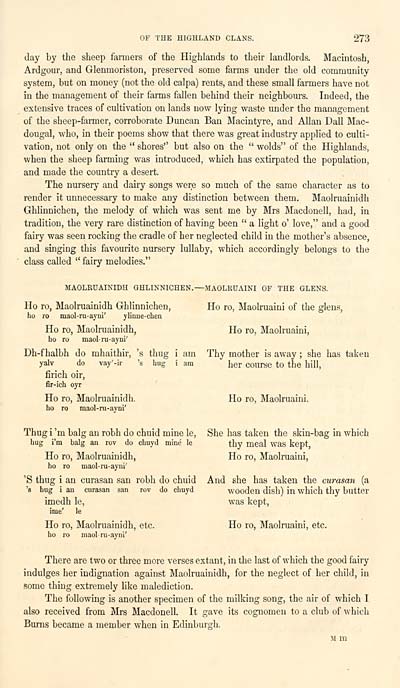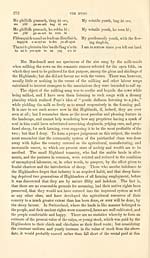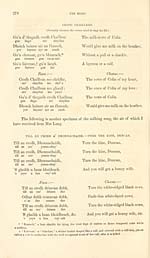Download files
Complete book:
Individual page:
Thumbnail gallery: Grid view | List view

OF THE HIGHLAND CLANS. 273
Jay by tlie sheep farmers of the Highlands to their landlords. Macintosh,
Ardgour, and Glenmoriston, preserved some farms under the old community
system, but on money (not the old calpa) rents, and these small farmers have not
in the management of their fanns fallen behind their neighbours. Indeed, the
extensive traces of cultivation on lands now lying waste under the management
of the sheep-farmer, corroborate Duncan Ban Macintyre, and Allan Dall Mac-
dougal, who, in their poems show that there was great industry applied to culti-
vation, not only on the " shores" but also on the " wolds" of the Highlands,
when the sheep farming was introduced, which has extirpated the population,
and made the country a desert.
The nursery and dairy songs were so much of the same character as to
render it unnecessary to make any distinction between them. Maolruainidh
Ghlinnichen, the melody of which was sent me by Mrs Macdonell, had, in
tradition, the very rare distinction of having been " a light o' love," and a good
fairy was seen rocking the cradle of her neglected child in the mother's absence,
and singing this favourite nursery lullaby, which accordingly belongs to the
class called " fairy melodies."
MAOLBUAINIDH GHLINNICHEN. — MAOLKUAINI OF THE GLENS.
Ho ro, Maolruainidh Ghlinnichen, Ho ro, Maolruaini of the glens,
ho ro maol-ru-ayui' ylinne-cheii
Ho ro, Maolruainidh, Ho ro, Maolruaini,
ho ro maol-ru-ayDÌ'
Dh-f halbh do mhaithir, 's thug i am Thy mother is away ; she has taken
yalv do vay'-ir 's hug i am her course to the hill,
firich oir,
fir-ich oyr
Ho ro, Maolruainidh. Ho ro, Maolruaini.
ho ro maol-ni-ayni'
Thug i 'm balg an robh do chuid mine le, She has taken the skin-bag in which
hug i'm balg an rov do chuyd mine le thy meal Was kept.
Ho ro, Maolruainidh, Ho ro, Maolruaini,
ho ro maol-ru-ayni'
'S thug i an curasan san robh do chuid And she has taken the curasan (a
'g hug i an curasan san rov do chuyd wooden dish) in which thy butter
imedh le, was kept,
ime' le
Ho ro, Maolruainidh, etc. Ho ro, Maolruaini, etc.
ho ro maol-ru-ayni'
There are two or three more verses extant, in the last of which the good fairy
indulges her indignation against Maolruainidh, for the neglect of her child, in
some thing extremely like malediction.
The following is another specimen of the milking song, the air of which I
also received from Mrs Macdonell. It gave its cognomen to a club of which
Burns became a member when in Edinburgh.
Jay by tlie sheep farmers of the Highlands to their landlords. Macintosh,
Ardgour, and Glenmoriston, preserved some farms under the old community
system, but on money (not the old calpa) rents, and these small farmers have not
in the management of their fanns fallen behind their neighbours. Indeed, the
extensive traces of cultivation on lands now lying waste under the management
of the sheep-farmer, corroborate Duncan Ban Macintyre, and Allan Dall Mac-
dougal, who, in their poems show that there was great industry applied to culti-
vation, not only on the " shores" but also on the " wolds" of the Highlands,
when the sheep farming was introduced, which has extirpated the population,
and made the country a desert.
The nursery and dairy songs were so much of the same character as to
render it unnecessary to make any distinction between them. Maolruainidh
Ghlinnichen, the melody of which was sent me by Mrs Macdonell, had, in
tradition, the very rare distinction of having been " a light o' love," and a good
fairy was seen rocking the cradle of her neglected child in the mother's absence,
and singing this favourite nursery lullaby, which accordingly belongs to the
class called " fairy melodies."
MAOLBUAINIDH GHLINNICHEN. — MAOLKUAINI OF THE GLENS.
Ho ro, Maolruainidh Ghlinnichen, Ho ro, Maolruaini of the glens,
ho ro maol-ru-ayui' ylinne-cheii
Ho ro, Maolruainidh, Ho ro, Maolruaini,
ho ro maol-ru-ayDÌ'
Dh-f halbh do mhaithir, 's thug i am Thy mother is away ; she has taken
yalv do vay'-ir 's hug i am her course to the hill,
firich oir,
fir-ich oyr
Ho ro, Maolruainidh. Ho ro, Maolruaini.
ho ro maol-ni-ayni'
Thug i 'm balg an robh do chuid mine le, She has taken the skin-bag in which
hug i'm balg an rov do chuyd mine le thy meal Was kept.
Ho ro, Maolruainidh, Ho ro, Maolruaini,
ho ro maol-ru-ayni'
'S thug i an curasan san robh do chuid And she has taken the curasan (a
'g hug i an curasan san rov do chuyd wooden dish) in which thy butter
imedh le, was kept,
ime' le
Ho ro, Maolruainidh, etc. Ho ro, Maolruaini, etc.
ho ro maol-ru-ayni'
There are two or three more verses extant, in the last of which the good fairy
indulges her indignation against Maolruainidh, for the neglect of her child, in
some thing extremely like malediction.
The following is another specimen of the milking song, the air of which I
also received from Mrs Macdonell. It gave its cognomen to a club of which
Burns became a member when in Edinburgh.
Set display mode to: Large image | Transcription
Images and transcriptions on this page, including medium image downloads, may be used under the Creative Commons Attribution 4.0 International Licence unless otherwise stated. ![]()
| Early Gaelic Book Collections > Blair Collection > Treatise on the language, poetry, and music of the Highland clans > (285) |
|---|
| Permanent URL | https://digital.nls.uk/76239538 |
|---|
| Description | A selection of books from a collection of more than 500 titles, mostly on religious and literary topics. Also includes some material dealing with other Celtic languages and societies. Collection created towards the end of the 19th century by Lady Evelyn Stewart Murray. |
|---|
| Description | Selected items from five 'Special and Named Printed Collections'. Includes books in Gaelic and other Celtic languages, works about the Gaels, their languages, literature, culture and history. |
|---|

